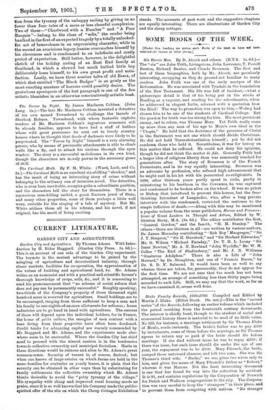[Under this heading we notice such Books of the nab
as haw not been reserved for review in other forms.] Sir Heroic Men. By D. Alcock and others. (R.T.S. ls. 6d.)— The "six" are John Frith, Livingstone, John Lawrence, T. Fowell Buxton, Richard Baxter, and Claude Brousson. The first and last of these biographies, both by Mr. Alcock, are peculiarly interesting, occupying as they do ground not familiar to many readers. John Frith was one of the early martyrs of the Reformation. He was associated with Tyndale in the translation of the New Testament. His life was full of incident,—what a picturesque detail is that of his being put in the stocks at Reading as a vagrant, and sending for the schoolmaster, whoa he addressed in elegant Latin, adorned with a quotation from the Iliad ! The way to promotion was open to him,—Wolsey had chosen him to be one of the students of Cardinal College. But the passion for truth was too strong for him. His most persistent enemy, sad to relate, was Thomas More. Yet Frith really came up more than any man of his age to More's own ideal in the "Utopia." He held that the doctrince of the presence of Christ in the Sacrament was not one which should divide Christians. He did not hold Transubstantiation himself ; yet he did not condemn those who held it. Nevertheless, it was for heresy on this matter that he suffered. He could not deny his opinions, though he did not think the matter de fide. Generally Frith had a larger idea of religious liberty than was commonly reached for generations after. The story of Brousson is of the French Protestants, and in its way equally interesting. Brousson was an advocate by profession, who refused high advancement that he might cast in his lot with his persecuted co-religionists. In 1698, after thirteen years partly spent in exile, partly in ministering to his brethren in the Cevennes, he was captured and condemned to be broken alive on the wheel. It was no priest or Bishop that interfered to prevent this horror, but the free thinking Intendant of Languedoc, who, after a long private interview with the condemned, restricted the sentence to the simple infliction of death.---Along with this may be mentioned a popular volume from the same publishers, Heroes and Pioneers : Lives of Great Leaders in Thought and Action, Edited by W. Grinton Berry, M.A. (3s. 6d.) The editor contributes the first, "General Gordon," and the fourth, "H. M. Stanley." The others—there are thirteen in all—are written by various authors, Dr. James Macaulay contributing "'Rob Roy' Macgregor," " Sir J. Y. Simpson," "Sir H. Havelock," and "Sir Herbert Edwardes," Mr. G. Wilson "Michael Faraday," Dr. T. H. L. Leony "Sir Isaac Newton," Mr. A. N. Rowland "John Wycliffe," Mr. W. M. Colles " The Earl of Shaftesbury," and Mr. J. N. Williams "Gustavus Adolphus." There is also a Life of "John Howard," by Dr. Stoughton, and one of " Francis Bacon," by Dr. S. D. F. Salmond. It would have been as well to say whence these are taken, for, presumably, they do not appear for the first time. We are not sure that too much has not been attempted, an average of something less than thirty pages being accorded to each Life. Still, we may say that the work, so far as we have examined it, seems well done.










































 Previous page
Previous page